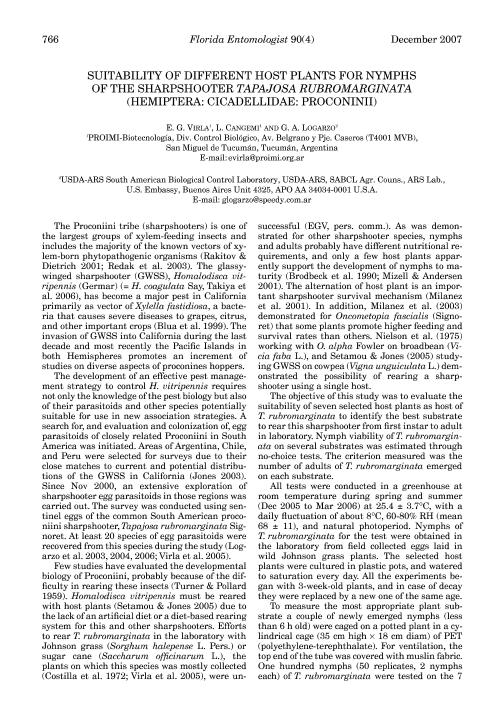Mostrar el registro sencillo del ítem
dc.contributor.author
Virla, Eduardo Gabriel

dc.contributor.author
Cangemi, Lorena

dc.contributor.author
Logarzo, Guillermo Alejandro

dc.date.available
2018-05-18T21:32:00Z
dc.date.issued
2007-12
dc.identifier.citation
Virla, Eduardo Gabriel; Cangemi, Lorena; Logarzo, Guillermo Alejandro; Suitability of Different Host Plants for Nymphs of The Sharpshooter Tapajosa rubromarginata (Hemiptera: Cicadellidae: Proconinii); Florida Entomological Society; Florida Entomologist; 90; 4; 12-2007; 766-769
dc.identifier.issn
0015-4040
dc.identifier.uri
http://hdl.handle.net/11336/45700
dc.description.abstract
The glassy-winged sharpshooter (GWSS), Homalodisca vitripennis(Germar) has become a major pest in California primarily as a vector of Xylella fastidiosa a bacteria that cause severe diseases to grapes. Owing to the uncertainty of the effectiveness of egg parasitoids native to California against GWSS, a neo-classical biological control approach is ongoing. The survey of natural enemies is conducted on leafhoppers closely related to the target pest in South America. In 2000, egg parasitoids of Tapajosa rubromarginata, a sharpshooter closely related to GWSS, were sought in regions in South America where climate types and habitats were similar to California. Nymphs and adults have different nutritional requirements, alternating host plant as a survival mechanism. Apparently, only a few host plants support the development of nymphs to maturity. We tested the viability of nymphs of T. rubromarginata reared on sweet orange, corn, bermuda grass, rescuegrass, bur clover, cowpea, and a combination of mint + oat as an attempt to determine a suitable substrate to rear this sharpshooter. We recorded high mortality of the newly emerged nymphs maintained with rescuegrass, sweet orange, corn, Bermuda grass and bur clover. Nymphs successfully reached the adult stage only eating on cowpea plants and the combination of mint + oat. Based on the observed survival rate and the number of individuals that reached the adult stage, cowpea was the most appropriate substrate for rearing in the laboratory.
dc.format
application/pdf
dc.language.iso
eng
dc.publisher
Florida Entomological Society

dc.rights
info:eu-repo/semantics/openAccess
dc.rights.uri
https://creativecommons.org/licenses/by-nc/2.5/ar/
dc.subject
Diet
dc.subject
Proconiini
dc.subject
Laboratory Rearing
dc.subject
Cowpea
dc.subject.classification
Otras Ciencias Biológicas

dc.subject.classification
Ciencias Biológicas

dc.subject.classification
CIENCIAS NATURALES Y EXACTAS

dc.title
Suitability of Different Host Plants for Nymphs of The Sharpshooter Tapajosa rubromarginata (Hemiptera: Cicadellidae: Proconinii)
dc.type
info:eu-repo/semantics/article
dc.type
info:ar-repo/semantics/artículo
dc.type
info:eu-repo/semantics/publishedVersion
dc.date.updated
2018-04-18T17:41:45Z
dc.identifier.eissn
1938-5102
dc.journal.volume
90
dc.journal.number
4
dc.journal.pagination
766-769
dc.journal.pais
Estados Unidos

dc.journal.ciudad
Nueva York
dc.description.fil
Fil: Virla, Eduardo Gabriel. Consejo Nacional de Investigaciones Científicas y Técnicas. Centro Científico Tecnológico Conicet - Tucumán. Planta Piloto de Procesos Industriales Microbiológicos; Argentina
dc.description.fil
Fil: Cangemi, Lorena. Consejo Nacional de Investigaciones Científicas y Técnicas. Centro Científico Tecnológico Conicet - Tucumán. Planta Piloto de Procesos Industriales Microbiológicos; Argentina
dc.description.fil
Fil: Logarzo, Guillermo Alejandro. United States Department Of Agriculture. Agricultural Research Service. Overseas Biological Control Laboratories. South American Biological Control Laboratory; Argentina
dc.journal.title
Florida Entomologist

dc.relation.alternativeid
info:eu-repo/semantics/altIdentifier/url/http://journals.fcla.edu/flaent/article/view/75736
dc.relation.alternativeid
info:eu-repo/semantics/altIdentifier/doi/https://doi.org/10.1653/0015-4040(2007)90[766:SODHPF]2.0.CO;2
dc.relation.alternativeid
info:eu-repo/semantics/altIdentifier/url/http://www.bioone.org/doi/abs/10.1653/0015-4040%282007%2990%5B766%3ASODHPF%5D2.0.CO%3B2
Archivos asociados
